likeable characters
The thing I like most about characters in recurring works (TV series, comic series, book series, film series, etc.) -- ones that I enjoy, anyway -- is getting to spend time with them again and again. The action, adventure, and evolving plotlines can be a lot of fun, too -- but if I don't like the characters on some level (even if they're not all nice, like on The Shield), then I'm unlikely to check in again.
Take Invincible, for example -- a leisurely ramble (especially for a superhero book) even after the big reveal about his father galvanizes the plot. But Mark Greyson is fun to hang with even when he's not in the spandex:
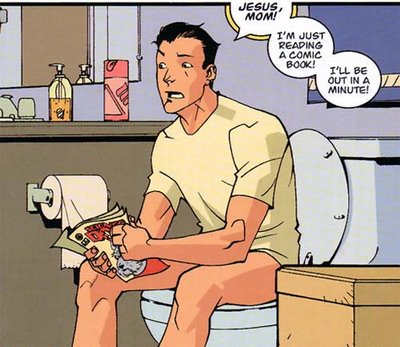
Mark doesn't have a central flaw, either (he doesn't hate Mexicans, or get turned on by shellfish, or whatever ridiculous flaws are so aften foisted upon otherwise perfectly good characters) -- the conflict in Invincible is driven entirely by external threats (aliens, villains, monsters) and characters with different perspectives, wants, and needs butting heads over how to proceed.
Spider-Man was like this too, especially during the classic Lee/Ditko and Lee/Romita years on Amazing -- and has been like this again in Bendis and Bagley's Ultimate Spider-Man.
I've tried to keep this likeability factor in mind while developing my own superhero, the Matriarch:
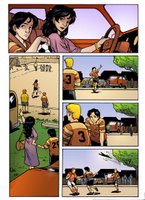
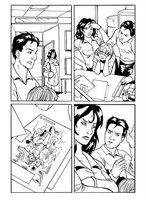
Sherry (the Matriarch) is built not on a central flaw, but rather on a basic tension: she has duties as a superhero as well as duties as a single mother, and these duties are not generally in harmony with one another. In a sense, the story of the Matriarch is how Sherry brings these duties into alignment (or, rather, how she resolves the contradiction by using her wits and resolve). I hope she comes across as likeable!
The Incredibles, I think, is fueled by a similar tension:
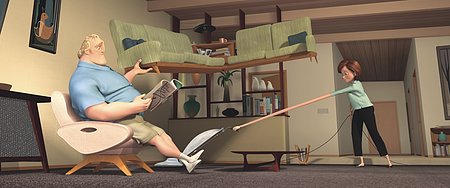
Mister Incredible is miserable in his office job not because of a flaw in his character, but because he isn't where he needs to be (ie. out saving lives and being a hero). Resolving the external conflict (saving the city from Syndrome), also resolves (or at least temporarily relieves) the internal problem.
I like to imagine that something like this is at work in my story Old School, about a (former?) hero now in his 80s called Ace, who is trying to live a quiet retirement. The tension is between this life he thinks he is supposed to live, and the life he was born to live -- the life of a hero.

Not that the flaw as characterization can never work: it just needs to fit naturally with the character and plot (see this post at The Blackwing Diaries for an example of a flaw that doesn't fit the character). I think the big badguy here is actually Aristotle, who developed the notion of the "tragic flaw" to explain tragic drama. The notion of the tragic flaw as applied to Shakespearean tragic heroes has become so common that I, anyway, was taught that this was the only way to understand the tragedies of Shakespeare.
Belatedly, I'm realizing that Aristotle was full of crap. Hamlet's fatal flaw is idecisiveness, end of story? -- of course it isn't. There are innumerable ways to interpret Hamlet's character and motivations, and forcing the play to fit the tragic flaw formula felt awkward to me even back in High School. (Since everyone my age or older was forced to see things this way, could this be one of the chief sources of the belief that every character must have a flaw to overcome?).
Anyway, I have one more of my current projects to talk about: Twilight Precinct. (This whole post is really just me assimilating the realization that characters don't necessarily have to possess a central flaw (thanks, Jenny!) and reevaluating my work in light of it -- sorry if it's all a bit self indulgent).
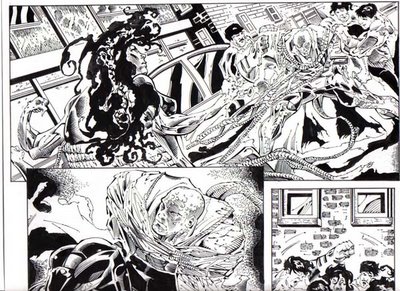
Twilight Precinct is a macho kind of superhero (or anti-hero) book, and I actually designed the main character of this one with a flaw. The difference between this flaw (my protagonist has trust issues and tries to do absolutely everything himself) and, say, the flaw Marty McFly suddenly develops in Back 2 the Future II -- is that the protagonist in Twilight Precinct will never outgrow his flaw. He really can't, since it's what makes him a badass badguy bashing machine.
So -- likeable characters is one of the main reasons I watch certain shows and read certain comics. The other big one (a topic for a future post, I think) is setting. And when these two things, character and setting, work in unison -- well, that's where the magic happens for me. :)
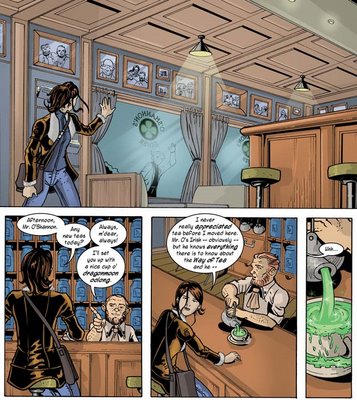 24
24


0 Comments:
Post a Comment
Subscribe to Post Comments [Atom]
<< Home